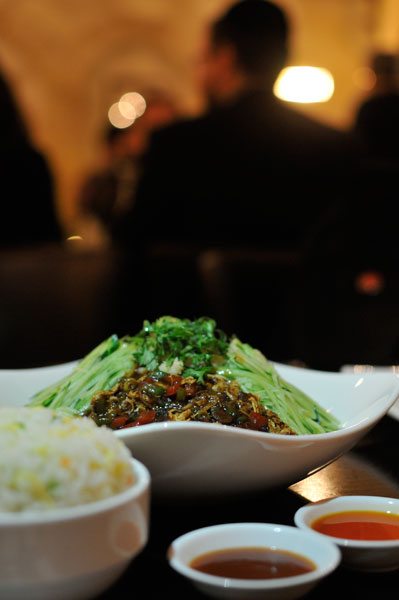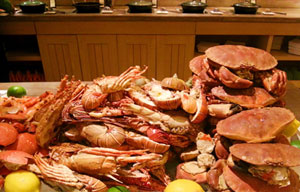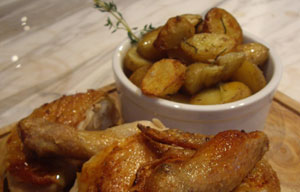Chinese food in Jewish world, kosher or not?
 |
|
Food served in Sheyan, a Chinese food restaurant owned by an Israeli boss in Jerusalem, on Sunday, May 5, 2013. At another table, some Jewish customers are enjoying their meals. [Photo by CRIENGLISH.com] |
"Sheyan" has four Chinese and one Israeli chefs. Besides, it employs two religious Jewish men to supervise the cooking to make sure it's kosher. Zhao Guanglong, a Chinese chef who has worked here for over four years, said in addition that all the materials must be kosher, the processes to cook them should also follow certain rules. For example, the raw materials are not allowed to be put on fire by common chefs. This process must be done by religious people unless the food is already half-cooked.
The restaurant has operated in Rehavia, an upscale Jerusalem neighborhood, for eight years. Most of the customers are religious Jewish immigrants from the United States who com regularly. According to Nadav Kramer, the manager of the restaurant, most of the dishes here have been changed to adapt to their customers' tastes, sweeter, less spicy.
"The ingredients are pretty much the same, but you can say (the flavors are) very different," said Kramer. The Israeli manager himself really like more original Chinese food, which he had tasted when the chefs made for themselves, but he thinks most of western people don't enjoy the original flavors.
Kramer's words were confirmed by a religious couple surnamed Klein who lives in another city in Israel and come to Sheyan every time they visit Jerusalem. Mr. Klein, who wore a high black hat on his head, said the food here is exactly his taste. Mrs. Klein also likes the food very much, saying it's not so heavy, and not very greasy. Another thing that attracts her is that the restaurant is clean. "Every glass, after they wash it, they put it up to the light and watch, to check if it's clean," said Mrs. Klein. "People in this area, Rehavia, are very meticulous, so they cater to the area and the food is delicious."
But for people who are not that religious and have tasted more original Chinese food, things are a little bit different. Elaine Pradley, who comes from England with her husband to visit their daughter in Jerusalem, celebrated her birthday in Sheyan. Pradley had been here before and likes the food very much, that's why she came for her birthday. The couple live in Liverpool, which has a very big and old Chinese community, with lots of Chinese restaurants offering more traditional Chinese food. By comparison, Elaine Pradley said she likes the flavor here, but prefers the traditional. The couple are planning to visit China in September for travelling and looking forward to tasting more original Chinese food.
Joel Parker, an American historian residing in Israel, said he joined a summer camp to China when he was 13 years old. He visited Beijing and Chengdu, and missed the Sichuan food very much. "Outside China you can't find it anywhere," said Parker. "It says Sichuan on the menu but it's not. It's different, never the same."
But there's good news for him. During the Spring Festival this year, the city of Chengdu held a "Sichuan food festival" for five days in Haifa. Chefs from Chengdu keep the original Sichuan food flavors while obeying the kosher rules. The festival turned to be a success and some Israeli chefs will go to Chengdu later this year to learn more about cooking Sichuan food. So maybe one day, Parker can re-experience "the best" flavor right inside Israel. "It's cool!" he said.


















